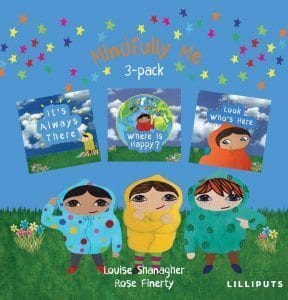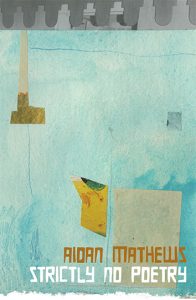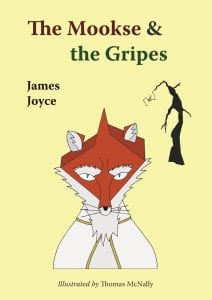The Lilliput Press 2018 Titles
The Lilliput Press has an exciting and varied list of books for you to look forward to this year.
March 2018
The Mindfully Me Series, Louise Shanagher with illustrations by Rose Finerty

This is a wonderful series of books on mindfulness for children which addresses the rise in young children’s anxiety and stress in a practical and helpful way.
– It’s Always There focuses on breathing patterns as a practical method of helping children to deal with a situation they find stressful.
– Where is Happy? encourages children to practice finding peace and happiness within themselves. It prompts children to question whether external things such as toys and sweets really bring lasting happiness.
– Look Who’s Here focuses on naming a range of different emotion, from joy to anger and sadness.
Each book is accompanied by workbook pages.
‘A treasure in the infant classroom. The children often call it their favourite book and it almost instantly creates a calming, safe atmosphere for them. I begin using it in September and by the midterm the children are using the techniques … The impact of this book in my classroom has been hugely beneficial and I look forward to using it again and again.’
– Edel Walsh, Primary School Teacher
From a Low and Quiet Sea (Dublin Edition), Donal Ryan
Three men. Each searching for something they have lost. Each, in his turn, trying to make sense of the road he has chosen.
For Farouk, family is all. He has protected his wife and daughter as best he can from the war and hatred that has torn Syria apart. If they stay, they will lose their freedom, will become lesser persons. If they flee, they will lose all they have known of home, for some intangible dream of refuge in some faraway land across the merciless sea.
Lampy is distracted; he has too much going on. He has Eleanor for a bit of fun, but she’s not Chloe, and Chloe took his heart away when she left him. There’s the secret his mother will never tell him. His granddad’s little sniping jokes are getting on his wick. And on top of all that, he has a bus to drive; those old folks from the home can’t wait all day.
The game was always the lifeblood coursing through John’s veins: manipulating people for his enjoyment, or his enrichment, or his spite. But it was never enough. The ghost of his beloved brother, and the bitter disappointment of his father, have shadowed him all his life. And now it’s cold – so very cold – and that lifeblood is slowing down, and he’s not sure if God will listen to his pleas for forgiveness.Three men, searching for some version of home, their lives moving inexorably towards a
reckoning that will draw them all together.
April 2018:

Strictly No Poetry, Aidan Mathews
Strictly No Poetry, Mathews’ fourth volume of poetry, follows upon Windfalls (Dolmen 1977), Minding Ruth (Gallery 1983) and According to the Small Hours (Cape 1998), and has been long awaited.
In these forty-eight remarkable individual poems and sequences, Mathews lays out his witness to the travails and joys of youth and age, to the passing political parade and the intimacies of nature, to the exigencies of parenthood, of frailty and endurance. Informed by a Dublin sensibility, he holds fast to spiritual traditions while testing the parameters and indulgences of the modern world. His voice, by times Keatsian in its lyric penetration, is humanist in its instincts, universal in its reach, and exerts a singularity that leaves no shadow.
May 2018
Soldiers of Literary: A Study of Fenianism 1848 – 1908, Eva Ó Cathaoir
Based on extensive archival research, this fascinating monograph rescues from obscurity the lives over a thousand Fenians. Fenianism railed against the depopulation of a post-Famine Ireland, asserting the rights of ordinary people in defiance of the British Empire, then often supported by the emergent Catholic middle class. As a tenacious conspiracy, represented in these islands by the Irish Republican Brotherhood, Fenianism propagated an independent, egalitarian republic through travelling organizers and radical newspapers, inspired by the ideals of Theobald Wolfe Tone. Soldiers of Liberty traces the secret organization throughout Ireland, Britain, North America and Australasia, highlighting the contribution of Fenian women and the often tragic lives of committed activists, while revealing the hitherto-unknown fate of ubiquitous informers enlisted by Dublin Castle.
June 2018

The Mookse and The Gripes, James Joyce with an introduction and illustrations from Thomas McNally
The Mookse and the Gripes is James Joyce’s peculiar and hilarious re-telling of Aesop’s ancient fable of ‘The Fox and the Grapes’, as presented in Finnegans Wake (1939). This book consists of over one hundred colour illustrations by Irish artist Thomas McNally that run alongside Joyce’s text. Each illustration is based on a line from the fable; taken together, they help to interpret and illuminate the work. Reading through Joyce’s fable alongside the illustrations, readers will be offered an immediate introduction to Finnegans Wake and to its sense of the fantastical that is so intrinsic a feature of Joyce’s highly imaginative use of language. The book also contains an essay by McNally, providing further guidance to readers in their exploration of Joyce’s masterwork.
The Cruelty Men, Emer Martin
The Cruelty Men is a new novel by prize-winning author Emer Martin. It is a sweeping multigenerational view of an Irish-speaking family who moved from Kerry to the Meath Gaeltacht and the disasters that befall their children in Irish institutions. This story, spanning from the ‘30s to the late ‘60s, is narrated through linked family voices.
Martin’s brisk, accomplished tome offers a view of Irish misfortune and suffering: land issues, clerical abuse, systemic violence in societal and familial structures, the violent destruction of culture and community by state and church collusion. Martin’s mother and baby homes and Magdalene Laundries are the Irish cousins of Dostoevsky and Solzhenitsyn’s Gulags; her dispassionate depiction of the ordinary psychotic violence at the heart of families and society in rural Ireland is akin to that of Ferrante’s Naples. With an unflinching gaze and emotional punch, The Cruelty Men tells an emotional tale without sentimentality.
